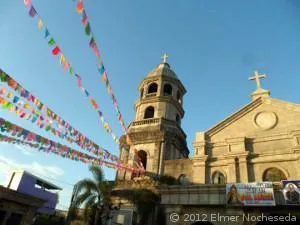Pateros, Paradise Lost in Economic Globalization
Dr. Ernesto R. Gonzales
What good can material progress do when economic gains are achieved at the expense of our own ecology and our way of life (cultural/ anthropological)? If only the oligarchy and the foreign investors are able to consolidate gains into their hands strengthened by the existing machinery of political governance, what portion of the economic rewards are left for the Filipino society? What benefits have we derived from our National Economy except meager wages in this system of contractualization, graft ridden system of taxations, and the massive socio-psychological pains inflicted to millions of our overseas contract workers. These realities are authenticated by the present trend, where for every 1% advance in the performance of the National Economy, there is an equivalent 9% spread in the dimensions of poverty in this country. Likewise, the phenomenon of the "missing middle income group" in the Filipino society is an indicator of the political economic malaise which had afflicted the homeland of this present generation.

In order to prove the existence of this circumstance, which is called herewith as the "economics of ecological anthropology in Pateros," three research methods were employed:descriptions, scientific estimations of coefficients of the economic, natural and cultural capital dimensions, and the phenomenological approach.
Utilizing these research techniques, it was found that the inflection point of economic globalization happened during the decades of the 1970s, 1980s, 1990s up the early stage of the first decade of the 2000s. In the economic front, instead of the normal birth rate of around 15 entrant babies each year, migration had reached a population increase of around 2,000 entrants annually. From the 1960s to 2000, agricultural activities in Pateros had decreased by 73%, while industrialization increased from zero manufacturing to 227 units, commerce and trade from 100 units in the 1960s to 1,120 units by 2000, and the entry of a total 55 commercial banking and peoples based credit organizations.
This phenomenon had wreaked havoc on the ecology of the town, as well as adversely affecting the endogenous way of life of the local people. There is a total of around 1 million duck eggs produced yearly in Pateros and around 70% of these are processed into "balut" or duck egg embryo. Balut, as a local industry, is able to radiate the system of interdependence between ecology and anthropology of Pateros. This industry has been the lifeblood of the mainstream economic system in this town, rivers-snaill gatherers-duck raisers and balut makers. The once cool and beautiful rivers have died.
The vast greenlands are replaced by the entry of subdivisions and industrial plants. The rows of bamboos beside the riverbanks are now replaced by the towers of high tension wires and cell sites. The sounds of the rondallas are replaced by electronic guitars while simple radios are now replaced by the chains of computers centers which have brought specially the youth of the town into the violent cyberspace of counterstrikes and partaking into the hatred and lies of the virtual worlds where we now live. The young are trapped by this world of technology and materialism which, after all, are not an absolute necessity in life. If the world of nature was replaced by a planet of technology and electronic gadgetries, how then can this society sees God? One can only see God in the greatness of the beauty of His Creation. As all of His creations and creatures are taken into the whirlwinds of change in a highly materialistic world, can we still transcend the spiritual mediocrity of our new world mechanistic materialism?
This moral decadence was also systematically studied and findings of the study prove the changing values of the town (Pateros) decimating the traditional way of celebrating life of ecological anthropology. In brief, there are the created imbalances between the system of economic capital vis-a-vis natural and cultural capital.
As there are many "Pateroses" in the so many growth corridors of economic globalization in the Philippines, this initial study of the integration of the sciences in the development debacle provides a new insight in the study of the Poverty which had engulfed this beatiful nation of 7,101 islands


